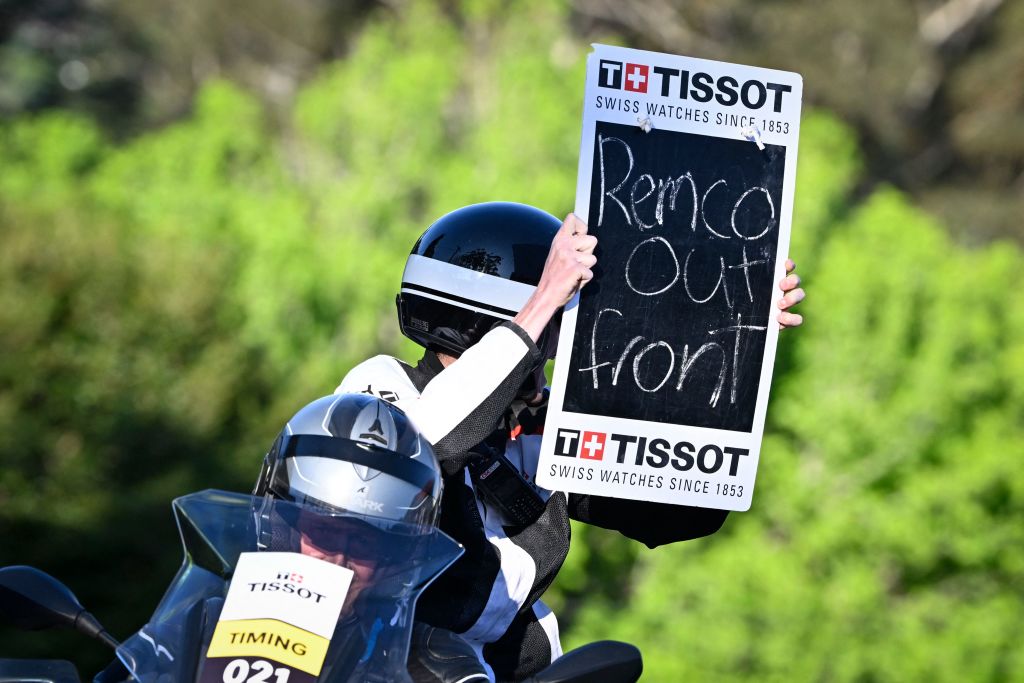UCI admits time gap communication failings at World Championships
Time gap slate holder 'not good' in Wollongong says sport director

UCI Sports Director Peter van den Abeele admitted to Sporza.be on Wednesday that there were mistakes made in communicating the time gaps and breakaway information to the peloton in the road races at last week's UCI Road World Championships.
After Remco Evenepoel soloed to victory in the elite men's road race, riders complained that they had no idea what place they were sprinting for.
Michael Matthews (Australia) said he only found out minutes after the finish that he had earned the bronze medal.
"We were talking in the peloton, [asking] if we were racing for anything because we didn't know where exactly anyone was," Matthews said on Sunday. "We just kept catching bunches. Even in the last 500 metres of the race. I was thinking we weren't even sprinting for top 10 and then I saw the French team lining up for Laporte and I jumped on the back of that and did my thing in the sprint."
A similar problem cropped up in last year's Olympic Games in Tokyo, where Annemiek van Vleuten (Netherlands) attacked thinking she was going for the gold medal only to find out after the finish she had finished second behind Austrian Anna Kiesenhofer.
Van den Abeele called the latest time board snafu in Wollongong a "learning experience", saying they would look for more experienced time board operators or other communication options for future events.
"You have to make an evaluation after every race and possibly adjust things in the next race," Van den Abeele told Sporza. "The functioning of the so-called ardoisier or sign man [a person on the back of a motorcycle who holds up a board with the time gap for riders - ed.] was not good at all in Australia. That is why we have already decided within the UCI to recruit people with experience for the upcoming World Championships.
Get The Leadout Newsletter
The latest race content, interviews, features, reviews and expert buying guides, direct to your inbox!
"We could ask people from, say, the Tour [de France], Giro [d'Italia] or Tour of Flanders and no longer outsource it to the local organizations or federations. We want to take everything in our hands to avoid such things."
There are other options for helping riders understand the race situation in the absence of race radios, which are banned at Worlds and the Olympics.
"We could also increase communication by using electronic signs in the feed zones, where the riders can see who is where in the race. By the way, this is already done under the finish arch, where the difference is displayed between the leader and the riders."
The UCI is not considering to allow riders to have radio communication with their team cars for Worlds. The UCI attempted to ban race radios from road races in 2011 but faced strong opposition from teams who felt they were necessary for communicating safety information. The federation settled on barring them in Worlds and Olympic Games where the courses are in a more controlled setting.
Van den Abeele said the ban is unlikely to be reversed because of the problems communicating time gaps. "The current president, David Lappartient, is not in favour of reversing it, so not much will change in the short term.
"It should make the race more attractive. You create more chaos - in the healthy sense of that word. If there are no earpieces, a rider has to rely more on his impulses and is less guided by instructions from the follow car.
"On the other hand, the safety of the rider must not suffer. At the World Cup or Olympics, where we ride mainly on a closed circuit, that safety is easier to control.
"As long as races are run on a closed circuit, it is acceptable because the safety risks are lower then. On an open circuit, it is totally different, there we favour earpieces for safety."

Laura Weislo has been with Cyclingnews since 2006 after making a switch from a career in science. As Managing Editor, she coordinates coverage for North American events and global news. As former elite-level road racer who dabbled in cyclo-cross and track, Laura has a passion for all three disciplines. When not working she likes to go camping and explore lesser traveled roads, paths and gravel tracks. Laura specialises in covering doping, anti-doping, UCI governance and performing data analysis.